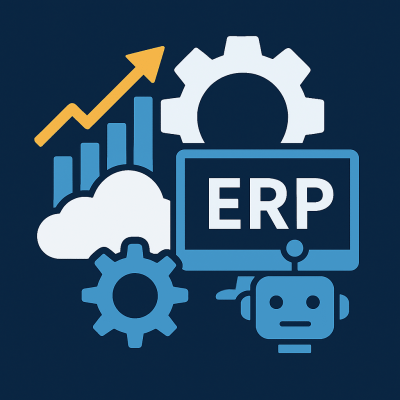Key ERP Statistics at a Glance
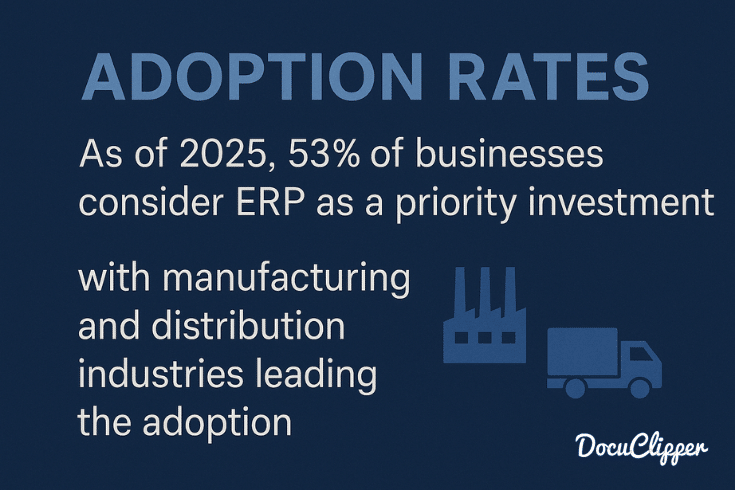
- Global ERP Market Size: The ERP market is projected to grow from $50.57 billion in 2023 to $123.41 billion by 2032, exhibiting a CAGR of 10.4% during the forecast period.
- Cloud ERP Adoption: Cloud-based ERP solutions are expected to account for 60% of the total ERP market by 2025, up from 40% in 2020.
- Adoption Rates: As of 2025, 53% of businesses consider ERP as a priority investment, with manufacturing and distribution industries leading the adoption.
- SaaS ERP Growth: Software-as-a-Service (SaaS) ERP solutions are growing at a rate of 17.4% annually, outpacing traditional on-premise ERP systems.
Global ERP Market Overview
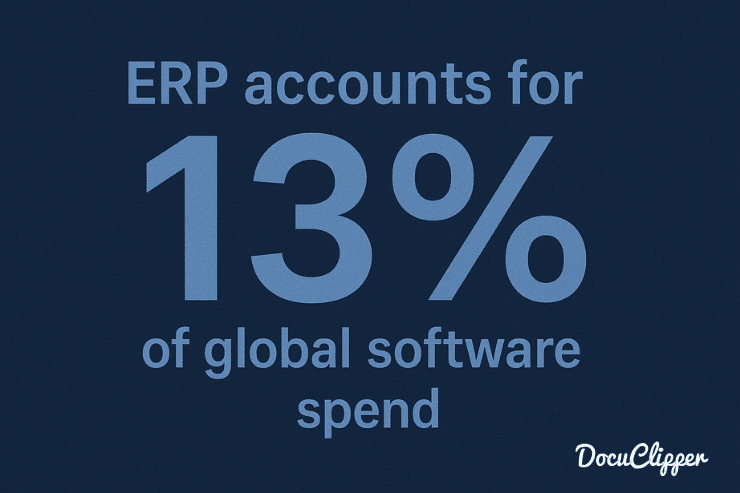
- The global ERP software market was valued at $50.57 billion in 2023 and is projected to grow to $123.41 billion by 2032, with a CAGR of 10.4%.
- North America accounted for approximately 35% of total ERP revenue in 2024, making it the leading region by market share.
- The Asia-Pacific region is the fastest-growing, expected to expand at a CAGR of 13.2% through 2026, driven by digital transformation efforts.
- SaaS and cloud-based ERP solutions are expected to represent over 60% of all ERP deployments by 2025, up from approximately 40% in 2020.
- ERP accounts for 13% of global software spend, It also makes up around 5% of total global IT spend.
Trends in ERP Implementation
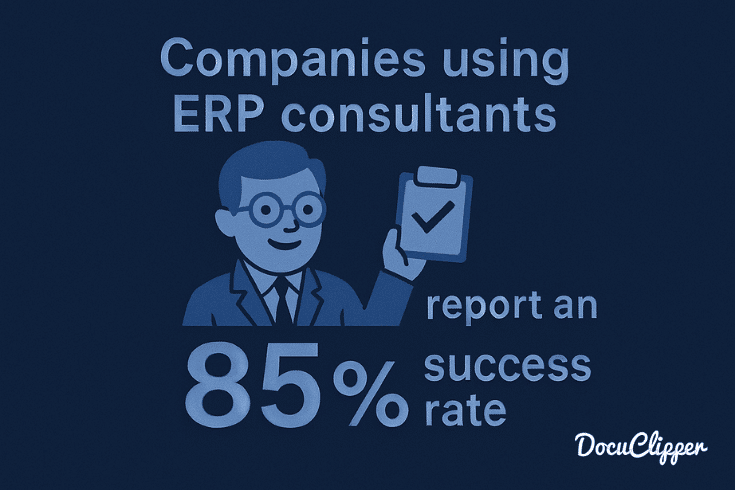
- 58.5% of companies prefer phased ERP implementation
- 20.8% use a big bang approach; 20.8% use a hybrid approach
- SMBs complete ERP projects in 3–9 months; enterprises take 6–18 months
- 64% of ERP projects experience budget overruns
- Top overrun causes: 38% underestimated staffing, 35% scope expansion, 34% technical issues
- 49% of companies go live on schedule; 27%are delayed; 11% fail to meet go-live dates
- Companies using ERP consultants report an 85% success rate
- Internal alignment and leadership support are cited as critical by 77% of successful implementers
Cloud ERP & SaaS Expansion
- The global cloud ERP market is projected to grow from $57.17 billion in 2024 to $181.04 billion by 2032, exhibiting a CAGR of 15.5% during the forecast period.
- Cloud ERP adoption is increasing, with 70.4% of ERP deployments being cloud-based in 2024, up from 69.8% in 2023; this share is expected to reach 75.9% by 2032.
- The cloud ERP market is expected to grow from $87.73 billion in 2024 to $172.74 billion by 2029, at a CAGR of 14.5% during the forecast period.
AI, Automation & ERP Intelligence
- By 2025, 65% of ERP vendors are expected to integrate AI and machine learning capabilities into their platforms to enhance forecasting, analytics, and approval processes.
- Organizations implementing AI-enabled ERP systems have reported a 20% improvement in forecasting accuracy and a 15% reduction in operational costs.
- The integration of Robotic Process Automation (RPA) with ERP systems has led to a 30% increase in efficiency for rule-based tasks and a 25% reduction in manual errors.
- ERP platforms with embedded intelligence features have enabled companies to achieve a 35% improvement in decision-making speed and a 20% enhancement in overall business agility.
Data, Access & Real-Time Decision-Making
- 64% of ERP projects experience budget overruns.
- Top causes of budget overruns include underestimating project staffing (38%), expansion of initial project scope (35%), and technical/data issues (34%).
- 49% of companies go live on schedule; 27% experience slight delays; 11% fail to meet the scheduled go-live date.
- Internal alignment and leadership support are cited as critical by 77% of successful implementers.
ERP ROI & Business Value
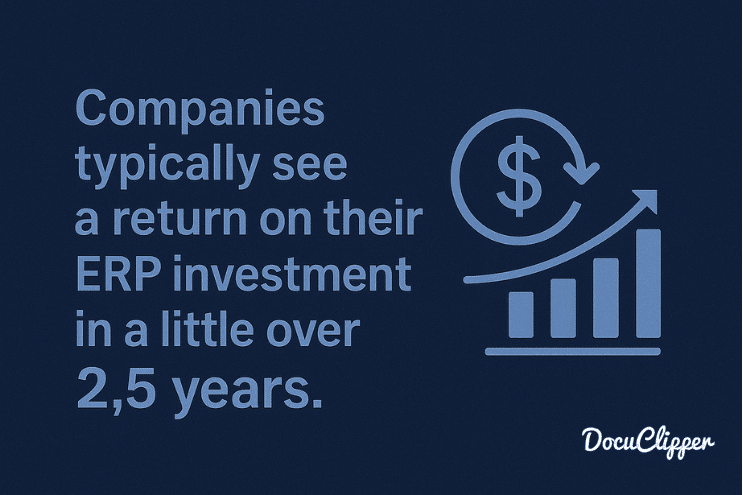
- The average ROI for an ERP project is 52%, meaning for every $1 invested, there’s an average return of $1.52.
- Companies typically see a return on their ERP investment in a little over 2.5 years.
- Among organizations that performed an ROI analysis prior to implementation and had been live for more than a year, 83% said the projects met their ROI expectations.
- 91% of companies that had at least one phase of the project live for a year or longer reported optimized inventory levels as a benefit.
- 78% of organizations reported improved productivity after ERP implementation.
- 62% of organizations reported that their ERP systems reduced costs, particularly in purchasing and inventory control.
- For midsize companies with revenue under $1 billion, the cost of owning an ERP system typically amounts to around 3–5% of their annual revenue.
- Large companies with revenue over $1 billion can expect the cost of owning an ERP system to be approximately 2–3% of their annual revenue.
Source
- Fortune Business Insights – ERP Market Size & Forecast
- Fortune Business Insights – Cloud ERP Market Forecast
- MarketsandMarkets – Cloud ERP CAGR & Revenue
- NetSuite (Oracle) – ERP ROI, Usage Stats, Productivity, Inventory
- The CFO Club – Implementation Methods & Timelines
- Retain International – ROI Benchmarks, Cost Percentages
- Cavallo – ERP Adoption Rates, Market Size
- KPC Team – ERP Implementation Challenges
- Top10ERP.org – ERP Security, Embedded Intelligence
- IACIS – ERP Data Quality Impact
- Parsimony – ERP ROI Averages
- BlueLink ERP – Go-Live Schedule Adherence
